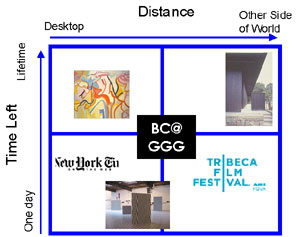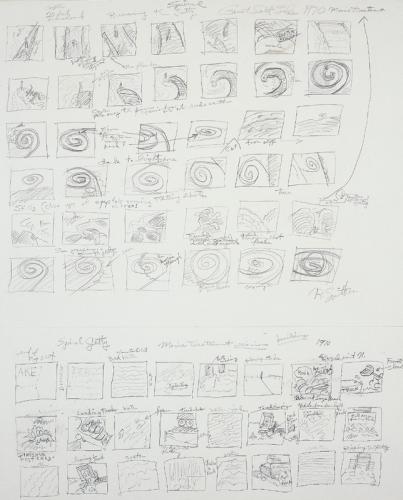MMMMWAHAHAHA. Wendy Mitchell demonstrates why she gets the big pro blogger bucks. Like free sample day at the Whole Foods cheese department, she’s laid out bites of Elvis Mitchell’s ripest metaphors for you to sample with your little review-reading toothpick.
[For those about to knock, we dispute you. Try writing like that yourself. It’s like making a sculpture from undercooked pasta; it’s not hard, exactly, but you’re probably gonna end up with a sticky mess.]
Things to do and when to do them
 In helpful, 2×2 grid format:
In helpful, 2×2 grid format:
Writing about making bottles
Whether it’s momentum, or a mindshare takeover, or a drive to push the site out of the nest and let it learn to fly, or the fact that I’ve changed 200 diapers in the last three weeks, I’ve been posting on daddytypes.com a lot more than here lately. And for that, I apologize.
Of course, if you’re interested in anything like the following, stop on by:
From The Spring Auctions
Inspired by Tyler@Modern Art Notes’s to-bid-on list for the upcoming contemporary art auctions. I don’t think I’ll be bidding against him on anything, especially now that he’s lining his pockets with all that ArtsJournal loot. Too rich for my blood.
But a flip through the catalogues turned up at least one must-get work. If Sotheby’s estimates are right for this storyboard Robert Smithson made for his Spiral Jetty movie, I may need to talk discreetly to someone about the street value of a small, cute, baby girl. She’s very advanced for her age and sleeps through the night.
“Smithson equated film stips to historical artifacts trapped in frames, with the movie editor acting as a paleontologist in reconstructing the whole. Smithson wrote ‘The movieola becomes a “time machine” that transforms trucks into dinosaurs.’ In its storyboard format, this detailed drawing by Smithson embodies his notion of historical evolution, fragmented over time, like pages torn from a book and scattered – a scene he enacted in the realized film of Spiral Jetty.”
Related: Smithson on the Jetty and geocaching
Sheena is a Punk Rocker’s Lawyer
 Bill Werde reports in the Times on the sad, dumb story of End of The Century, a highly praised documentary about The Ramones made by Michael Gramaglia and Jim Fields.
Bill Werde reports in the Times on the sad, dumb story of End of The Century, a highly praised documentary about The Ramones made by Michael Gramaglia and Jim Fields.
The article makes it sound like the two novice filmmakers are out more than $235,000 for production and post- to make their film, even though $150K of that is to Chinagraph, a post- house where Gramaglia’s brother works, which is listed as a production company for the film. That’s how indie docs work, my friend, you get your family to do a lot of work for free. So $65K out of pocket for a feature documentary? Nice work.
No, their real problem is entirely of their own making, and it’s captured perfectly in this anecdote from the film’s screening last year at Slamdance:
Penelope Spheeris, the director of the punk rock documentary “The Decline of Western Civilization” as well as “Wayne’s World,” introduced “End of the Century” at the Slamdance festival. Afterward, she found Mr. Fields. “She was like, `Wow, do you have all the music rights?’ I was like: `Yeah! Sure! Totally!’ I had no idea what she was talking about.”
Yes, they made a movie about a band without getting rights or releases for the interviews, performances, footage, or music.
Similar thing happened to a friend of mine, whose parking lot documentary about Deadheads screened at Sundance, but the band harshed their buzz. Ultimately, they had to release it without the Dead’s music, causing it to stink like the inside of a fry god’s rusty Honda.
A rule of thumb for all you dumbass, cheapass filmmakers out there: Get and use Michael Donaldson’s Clearance & Copyright: Everything the Independent Filmmaker Needs to Know. Bonus: In Filmmaker, Donaldson talks admiringly about Morgan Spurlock’s deft lawsuit-dodging while making Supersize Me.
Like vs. Love
I like Kill Bill vol. 2, but I’d like to see it together.
I LOVE George C. Scott’s warroom performance in Dr Strangelove. What comedy.
Kevin Spacey also getting into shorts
This Guardian exclusive wins the award for best comic timing of the week. It’s a diary of a young man who hooked up with Kevin Spacey online. Money changed hands. Drinks were plied. Gifts and trips were showered. Video was shot. But this time, apparently, no cell phones were stolen.
According to the Guardian, Spacey has set up a whole website just to meet young men who are ready to “do what it takes” to break into the film business.
British Government puts hand in shorts
In BFI’s May 2004 Sight & Sound, James Bell looks at the world of British shorts. His findings: proper support is very important, but hard to come by; when you need it most, there can be no reaction at all; when they can’t get someone else to do it with, people turn to handheld electronic devices to help them shoot, then they complain that it’s “not like the real thing”; people are going online for some action; the word “gag” comes up a lot; it rarely lasts longer than five minutes.
If this sounds suspiciously like the situation in our American shorts, just remember: in the UK, the whole thing’s funded by the government. [via GreenCine]
NY, NY, A Minimal Town
It’s a fine hook to hang a puff piece for the Guggenheim’s minimalism exhibit on: Tour the city with the curators and uncover the minimalism all around us. Should be ideal; so why would I rather take my chances on the Baghdad-Najaf local?
Is it the idea of riding around in a van all day? The constant competition for most nerve-fraying whine between Nancy Spector’s 3-month-old baby and chief curator/clotheshorse Lisa Dennison? (“There is a very real danger that I will start to shop, so we’d better be brief.”)
No, it’s the depressing realization that these supposedly high-octane New York artminds, augmented by artist and prolific writer Liam Gillick, couldn’t have come up with a more unimaginative, uninformative itinerary. With the exception of Donald Judd’s own studio/house in SoHo, their minimalist sites barely warrant looking up as your cab goes by.
Jil Sander (by Spector’s husband) instead of Calvin Klein (by maxi-minimalist and Judd cut-and-paster John Pawson)? The window at the Time Warner Mall instead of the Rose Center Planetarium (which did clear-glass curtainwall first, infinitely better, and happens to be by an actual architect)? Richard Meier’s silly Asia de Cuba or whatever the hell it’s called? (My guess: Lisa’s idea.)
And the piece de resistance: the Seagram building instead of something actually minimalist, like _____(I’m thinking.) This minimalist braintrust actually drinks the Miesian Koolaid, that it’s all about “structure as the expression of the buildng.” Mies was as much about decoration as the next classicist, it turns out, as the renovation of his IIT in Chicago proved. His structure was a veneer on top of the actual structure: aestheticized, artificial, techno-classicist.
[Update: I am not all right on this Mies nonsense, but it turns out I’m even lazier than a vanful of curators. And I’m too bored with their conceit to care. If you’re really interested in minimalism and the grid and its influence on the city, go read the chapter on how laying out the grid led to the development of the skyscraper in Koolhaas’s Delirious New York.
While I Was (heh) Out
The following were not reasons for my not posting for five days:
The Breakfast Club: IndieWIRE Edition
INT – A SCRUFFY CONFERENCE ROOM, LATE AFTERNOON
One by one, the bleary-eyed IndieWIRE staffers stumble into the room, looking in vain for the bagels and coffee.
JONNY LEAHAN Where’s the spread? Who the f(*& schedules a meeting this early and doesn’t order breakfast?
No one even looks up. Managing Editor WENDY MITCHELL, facedown on the table in a slowly expanding pool of drool, stirs briefly at the sudden noise, but doesn’t move. From this position, her jacket collar separates from her neck, which turns out to be covered with fresh hickeys..
BRIAN BROOKS Nan da, korya!, baka-baka-shii jikan tsubushi. Hima ja nai, ore. Maa, jitsu wa hima da kedo…
J.D. ASHCRAFT (wearily spitting out the punchline to an office joke gone stale) Suntory Time!
ANTHONY KAUFMAN Cut with the Lost in Translation, already.
BROOKS Ore no daihon was saisho datta! Sofia no Tokyo Story to zenzen chigau!
KEN TABACHNICK Dude, she beat you to it. It’s over . She won.
He headnods to WENDY, who still clutches a MoMA giftbag from the night before.
KAUFMAN
Write about something else, Kahane. Move on.
Online World According to Garp
You know how, in The World According to Garp, Robin Williams buys a house right after a plane crashes into it, because, hey, what are the odds of that happening again?
If you ascribe to a Garpian worldview, I invite you join me on Server30 at totalchoicehosting.com, where you’ll now be safe from DOS zombification and 5-day reconfiguration of all your websites.
Of course, then your mother would only five years older than you, and that s#*& is just (%!$ed up, man.
Cinderella Story
The classic “Cinderella story” speech from Caddyshack was written as an interstitial camera shot…Ramis took Murray aside and said, “When you’re playing sports, do you everjust talk to yourselflike you’re the announcer?”
Murray said, “Say no more,” and did his monologue in one take.
– Tad Friend’s great piece on Harold Ramis in the New Yorker.
When [I] asked about “the whole ‘Cinderella story’ from Caddyshack and that shot of Bill golfing under Mt. Fuji,” Sofia didn’t register. “I never saw it.”
 Buy Caddyshack on DVD and carry it around with you. Give it –and a stern talking to–to Sofia Coppola when you see her.
Buy Caddyshack on DVD and carry it around with you. Give it –and a stern talking to–to Sofia Coppola when you see her.
Buy Murray’s book, titled–you guessed it–Cinderella Story: My Life in Golf. [Or don’t, if the “See Inside!” excerpt is any indication.]
Bill Murray at BAM
If you’re planning to bumrush Bill Murray tonight at BAM to pitch him your 12-page script [“INT – ASSISTANT GREENSKEEPER’S HOUSE – NIGHT”], you’re a bigger chump than your ex said you were: it was Tuesday.
Don’t worry, you can still send a message “to” Bill at The Bill Murray Message Board, “just in case that actor ever visits this site”:
Date: 2/12/2004 – 9:42 PM
Name: Mickey
Comments : I am, at this moment, watching you on Letterman. and was very touched by your “psychic pull” remark re: your six children. I, admittedly, teared up as you said it – I have two children. (& love them dearly a good part of the time.) However, we are feeling that the psychic pull is more of a HAUNTING as our son enters young adulthood. I think boys should be banned! Girls are moodier and in a much more “in your face mode” but manageable. My question is, how can our 20 year old son and his two roommates generate a $400.00 cable bill for one month? We live in Vermont – not frickin’ L.A.. Please do not reply. I have had two glasses of Kendall Jackson and have NEVER before posted a message to a board/chatroom (cmpd wd?)My husband is out of town and I am just exercising a wild hair.
[4/21 Update: Check Joey’s play-by-play account of BAM’s Bill and Elvis Show at Tale of Two Cities. The line TOTC’s been waiting his whole life to hear from Jim Jarmusch (“It was so much fun getting Bill in a room with RZA and GZA.”) does absolutely nothing for me. I now feel very very stupid.]
Jon Routson, they’re coming for YOU
Police arrest 2 under new ‘anti-camcording’ law
15 Apr 2004 10:07am EDT – By Jesse Hiestand
The MPAA announced Wednesdaythe first arrests under a new California law targetting movie pirates who use camcorders in theaters. Min Jae Joun was arrested on suspicion of violating the anti-camcording law after theater personnel saw a red light from his camcorder during an April 10 screening of The Passion of the Christ at the Pacific Theatre at the Grove in Los Angeles. Joun’s next hearing date is May 5 in Los Angeles’ central arraignment court. Also arrested on suspicion of the misdemeanor charge was Ruben Centeno Moreno, who allegedly recorded The Alamo on April 12 at the Pacific Winnetka Theatre in the Chatsworth area of Los Angeles. A projectionist observed a light from the video camera and confirmed it using night-vision goggles, according to the MPAA. No hearing date has been set yet for Moreno. [via IMDb]
If you can actually tell me which of the three highlighted parts of this story is the craziest, I’ll paypal you a dollar.
Related: Jon Routson got a good, if cautionary, review for his current show of bootlegged films-as-art.

